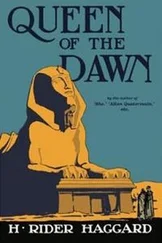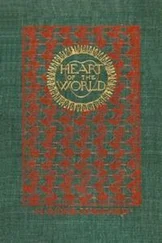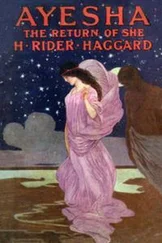When we woke the sun was shining high in the heavens. Evidently there had been rain towards the dawn, though as we were lying beneath the shelter of some broad–leaved tree, from it we had suffered little inconvenience. Oh! how beautiful, after our sojourn in those unholy caves, were the sun and the sea and the sweet air and the raindrops hanging on the leaves.
We did not wake of ourselves; indeed if we had been left alone I am sure that we should have slept the clock round, for we were terribly exhausted. What woke us was the chatter of a crowd of Orofenans who were gathered at a distance from the tree and engaged in staring at us in a frightened way, also the barks of Tommy who objected to their intrusion. Among the people I recognised our old friend the chief Marama by his feather cloak, and sitting up, beckoned to him to approach. After a good deal of hesitation he came, walking delicately like Agag, and stopping from time to time to study us, as though he were not sure that we were real.
"What frightens you, Marama?" I asked him.
"You frighten us, O Friend–from–the–Sea. Whence did you and the Healer and the Bellower come and why do your faces look like those of ghosts and why is the little black beast so large–eyed and so thin? Over the lake we know you did not come, for we have watched day and night; moreover there is no canoe upon the shore. Also it would not have been possible."
"Why not?" I asked idly.
"Come and see," he answered.
Rising stiffly we emerged from beneath the tree and perceived that we were at the foot of the cliff against which the remains of the yacht had been borne by the great tempest. Indeed there it was within a couple of hundred yards of us.
Following Marama we climbed the sloping path which ran up the cliff and ascended a knoll whence we could see the lake and the cone of the volcano in its centre. At least we used to be able to see this cone, but now, at any rate with the naked eye, we could make out nothing, except a small brown spot in the midst of the waters of the lake.
"The mountain which rose up many feet in that storm which brought you to Orofena, Friend–from–the–Sea, has now sunk till only the very top of it is to be seen," said Marama solemnly. "Even the Rock of Offerings has vanished beneath the water, and with it the house that we built for you."
"Yes," I said, affecting no surprise. "But when did that happen?"
"Five nights ago the world shook, Friend–from–the–Sea, and when the sun rose we saw that the mouth of the cave which appeared on the day of your coming, had vanished, and that the holy mountain itself had sunk deep, so that now only the crest of it is left above the water."
"Such things happen," I replied carelessly.
"Yes, Friend–from–the–Sea. Like many other marvels they happen where you and your companions are. Therefore we beg you who can arise out of the earth like spirits, to leave us at once before our island and all of us who dwell thereon are drowned beneath the ocean. Leave us before we kill you, if indeed you be men, or die at your hands if, as we think, you be evil spirits who can throw up mountains and drag them down, and create gods that slay, and move about in the bowels of the world."
"That is our intention, for our business here is done," I answered calmly. "Come now and help us to depart. But first bring us food. Bring it in plenty, for we must victual our boat."
Marama bowed and issued the necessary orders. Indeed food sufficient for our immediate needs was already there as an offering, and of it we ate with thankfulness.
Then we boarded the ship and examined the lifeboat. Thanks to our precautions it was still in very fair order and only needed some little caulking which we did with grass fibre and pitch from the stores. After this with the help of the Orofenans who worked hard in their desperate desire to be rid of us, we drew the boat into the sea, and provisioned her with stores from the ship, and with an ample supply of water. Everything being ready at last, we waited for the evening wind which always blew off shore, to start. As it was not due for half an hour or more, I walked back to the tree under which we had slept and tried to find the hole whence we had emerged from the tunnel on to the face of the cliff.
My hurried search proved useless. The declivity of the cliff was covered with tropical growth, and the heavy rain had washed away every trace of our descent, and very likely filled the hole itself with earth. At any rate, of it I could discover nothing. Then as the breeze began to blow I returned to the boat and here bade adieu to Marama, who gave me his feather cloak as a farewell gift.
"Good–bye, Friend–from–the–Sea," he said to me. "We are glad to have seen you and thank you for many things. But we do not wish to see you any more."
"Good–bye, Marama," I answered. "What you say, we echo. At least you have now no great lump upon your neck and we have rid you of your wizards. But beware of the god Oro who dwells in the mountain, for if you anger him he will sink your island beneath the sea."
"And remember all that I have taught you," shouted Bastin.
Marama shivered, though whether at the mention of the god Oro, of whose powers the Orofenans had so painful a recollection, or at the result of Bastin's teachings, I do not know. And that was the last we shall ever see of each other in this world.
The island faded behind us and, sore at heart because of all that we had found and lost again, for three days we sailed northward with a fair and steady wind. On the fourth evening by an extraordinary stroke of fortune, we fell in with an American tramp steamer, trading from the South Sea Islands to San Francisco. To the captain, who treated us very kindly, we said simply that we were a party of Englishmen whose yacht had been wrecked on a small island several hundreds of miles away, of which we knew neither the name, if it had one, nor the position.
This story was accepted without question, for such things often happen in those latitudes, and in due course we were landed at San Francisco, where we made certain depositions before the British Consul as to the loss of the yacht Star of the South. Then we crossed America, having obtained funds by cable, and sailed for England in a steamer flying the flag of the United States.
Of the great war which made this desirable I do not speak since it has nothing, or rather little, to do with this history. In the end we arrived safely at Liverpool, and thence travelled to our homes in Devonshire.
Thus ended the history of our dealings with Oro, the super–man who began his life more than two hundred and fifty thousand years ago, and with his daughter, Yva, whom Bastin still often calls the Glittering Lady.
Chapter XXVII
Bastin Discovers a Resemblance
There is little more to tell.
Shortly after our return Bickley, like a patriotic Englishman, volunteered for service at the front and departed in the uniform of the R.A.M.C. Before he left he took the opportunity of explaining to Bastin how much better it was in such a national emergency as existed, to belong to a profession in which a man could do something to help the bodies of his countrymen that had been broken in the common cause, than to one like his in which it was only possible to pelt them with vain words.
"You think that, do you, Bickley?" answered Bastin. "Well, I hold that it is better to heal souls than bodies, because, as even you will have learned out there in Orofena, they last so much longer."
"I am not certain that I learned anything of the sort," said Bickley, "or even that Oro was more than an ordinary old man. He said that he had lived a thousand years, but what was there to prove this except his word, which is worth nothing?"
Читать дальше







![О Генри - Рыцарь удачи [The Assessor of Success]](/books/405349/o-genri-rycar-udachi-the-assessor-of-success-thumb.webp)




